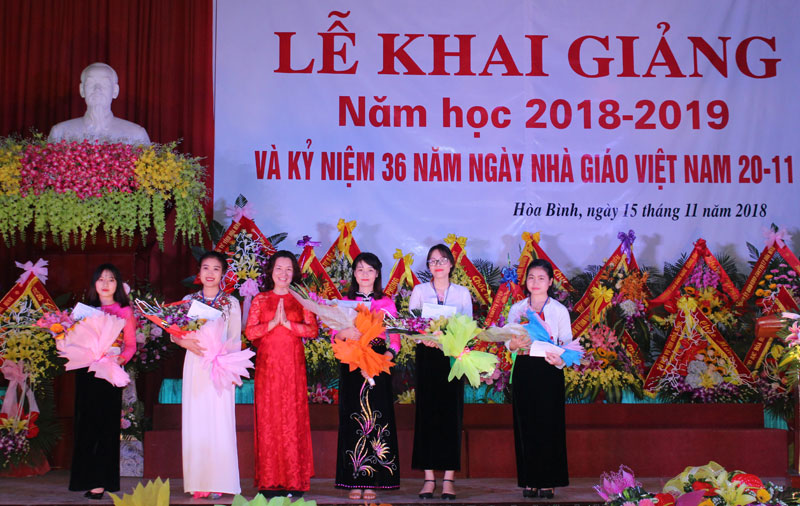
(HBO) - On November 15th, Hoa Binh College of Education held the Opening Ceremony of the school year 2018 - 2019 and the 36th anniversary of Vietnam Teachers' Day. Mr. Bui Van Cuu, the Member of the Provincial Party Committee, the Vice Chairman of the provincial People's Committee attended and greeted the College.
In the school year of 2018 - 2019, Hoa Binh
College of Education recruited 120 new students of Intake 27. Currently, the
college is associating with other universities to train 15 classes with 1,037
students of university majors of elementary school and kindergarten. Performing
the assigned tasks, from 1995 up to now, the school has trained nearly 12,500
full-time teachers, 9,400 teachers of distance education and school-level
managers for more than 3,000 students to meet the human resources for the
education sector of the province as well as some provinces in the Northwest
Region. Meeting the needs of the society and preparing for the renovation of
the program and textbooks, the school has updated and adjusted the training
program, creating the maximum conditions for learners to accumulate credits,
learn two degrees at the same time and university degree. The school also
diversified forms of training, development of high quality practice school from
preschool to secondary school.

Mr. Bui Van Cuu, the Provincial Party
Committee's Secretary, Vice Chairman of the provincial People's Committee
presented flowers to the school on the occasion of the opening ceremony of the
school year and the 36th anniversary of Vietnam Teachers' Day.

The College Board rewarded 5 freshmen with
excellent achievements in the entrance enrollment of the school year 2018 -
2019.
Hoa Binh province is undergoing a dynamic transformation amid Vietnam’s national digital transition. Building on Poliburo’s Resolution No. 57-NQ/TW on breakthroughs in science, technology, innovation, and national digital transformation, the province has rolled out a wide range of practical action plans. A standout initiative is the "Digital Literacy for All” movement, an effort to ensure that no one is left behind in the digital era.
Hoa Binh province is undergoing a dynamic transformation in the wake of the national digital transformation movement. Building on Resolution No. 57-NQ/TW of the Politburo on breakthroughs in science, technology, innovation, and national digital transformation, the province has implemented a wide range of practical action plans. A standout initiative is the "Digital Literacy for All” movement ambitious effort to ensure that no one is left behind in the digital age.
With a spirit of unity and proactive problem-solving, the Party Committee, the government and the people of Dong Lai Commune (Tan Lac District) have made great strides in implementing the resolutions of the 24th Party Congress of the commune for the 2020 - 2025 term. Focusing on leadership and practical actions, the commune has brought the Party’s resolutions into daily life, creating strong impacts and pushing the local development forward.
Amid the nationwide push for digital transformation, young people in Hoa Binh Province are stepping up as dynamic pioneers, applying technology to enhance Youth Union operations and expand the reach of youth-led initiatives. Through creativity and adaptability, Youth Union organizations at all levels have introduced a series of practical solutions, contributing to modern governance and community development.
In recent years, An Nghia commune, located in Lac Son district, has stepped up administrative reform, focusing on improving the quality and efficiency of its single-window service unit for receiving and processing administrative procedures. These improvements have helped create favourable conditions for local residents and organisations to handle administrative procedures, contributing to the commune’s broader socio-economic development.
The Prime Minister-approved master plan to develop the multi-use value of forests ecosystems through 2030, with a vision to 2050, aims to improve the management and sustainable use of forest resources, create jobs, increase incomes, and improve the living standards of ethnic minorities, people in mountainous and remote areas, forest workers and those living near forests.




